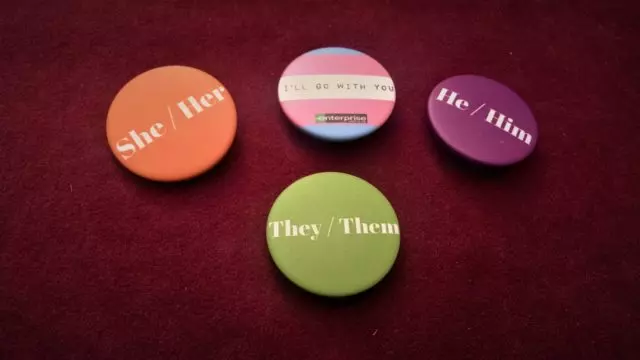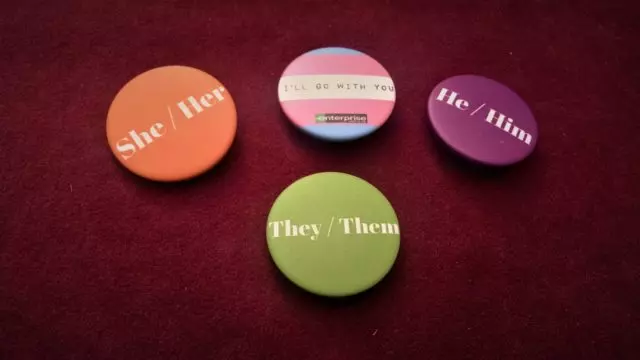Abroad in Ireland as a Transgender Student: A Journey of Self-Love



The week before I traveled abroad, I pored over my packing list, staring at the crumpled piece of paper until my eyes hurt. I was certain I would forget something crucial, that I would be the only one without it. Medication to last me through December? Check, I reassured myself for the hundredth time. Wool socks? Yes. Noise-canceling headphones? Yes.
The night before I left, I slipped my binder into my suitcase, among my extra socks. I hadn’t yet decided whether I’d wear it regularly. On the one hand, it offered comfort: a flat chest offered respite from body dysphoria, at least. On the other, being transgender is exhausting enough at home. Here in the States, I have the words to tell my story, even if people aren’t understanding. I had no idea what I’d find in Ireland.
Oh, I did the research. I knew that despite its conservative, predominantly Catholic populace, Ireland was the first country in the world to legalize same-sex marriage. I know my host university, NUI Galway, has a lively LGBT+ society. But often I have found, as someone who exists between boundaries, whose identity is not always clear-cut, the welcome I find in these “accepting” spaces is conditional. If I’m too complicated, or I don’t pass, or I’m too vocal, I don’t belong. It’s tricky, but it’s life.
Coming to Galway, I knew I wanted to be out, but I didn’t know what form that would take. I’d been dreaming of being out and unapologetic, correcting people on my name and pronouns, and requesting non-gendered language from the start. But I was too worried about being lonely. The first time “she” passed someone’s lips in reference to me, I shrugged, resigned. I was too tired to fight this battle today, and compensated by coding myself gay, with my hair shaved short: butch flannels, beanies, men’s jeans, and more-than-occasional references to LGBT+ organizations at home.
Feeling doubts and making excuses
When you’ve got an invisible identity—in gender, but also sexuality, ethnicity, disability, etc.— you learn to navigate many spaces, because you must. In Ireland, I followed suit, willing to keep my transgender identity under wraps as long as I was perceived as ambiguously LGBTQ. It was basic hospitality, after all, I told myself: I was a guest in strangers’ homes. Why inconvenience them with all this complexity?
Every time I considered coming out, I had a different internalized excuse. Being trans was too political. It was too complicated. I was oversensitive, asking people to change their language. The doubts in my mind echoed sentiments I’d heard from so many people in the United States, so I kept silent.
For all the time and tears I put into coming out at home, my arrival in Galway had me back at square one. I wasn’t trying to hide, really. I wouldn’t have denied it if someone asked me if I was transgender, but I was too tired to explain who I was every time I met someone.
The day of NUIG’s involvement fair, I made a beeline for the Gay in Galway Society (GiG) table, garlanded with pride flags. I can’t exactly remember what I said as I signed up, but it was something like “I need to be around other trans people like I need to breathe.” At the first meet and greet, when someone asked me my pronouns, I think I cried a bit. It’s hard to realize how stuffy a room is, until someone opens the window and offers you fresh air.
Asserting my identity
It was then I realized I couldn’t stay silent for the next four months. And so I began to chip away at the restrictions, piece by piece, difficult as it was. I am lucky to have supportive friends at home, a solid community to rely on. Their encouragement made the long process of asserting my identity less anxiety-inducing.
After a month in Ireland, I came out to my fellow IFSA-Butler students and even a few international friends. I know they aren’t perfect with the language they use, and that they may not see me the way that I see myself. But I come out for me, more than for anyone else, and whatever follows is worth it when I can be true to who I am. My gender identity is as much a part of my life as wearing glasses or being left handed. In the same vein, I can’t pare it away from the rest of myself, for the sake of convenience, acceptance, or anything else.
Studying abroad, they say, is life changing. It offers a glimpse into other ways of life and other parts of the world, and a means of transfiguring your self. My trans, non-binary, and gender non-conforming siblings and I do this every day, navigating and adapting to a world that doesn’t always see us as we are or respect our stories. Given our already unique relationship to identity, the changes that come with being abroad carry special power.
It’s an experience to embrace. It’s not always easy, but in the end, re-becoming myself never felt better.
Sketch M. | University of Redlands | IFSA University of Galway Partnership | Fall 2017 | IFSA International Correspondent